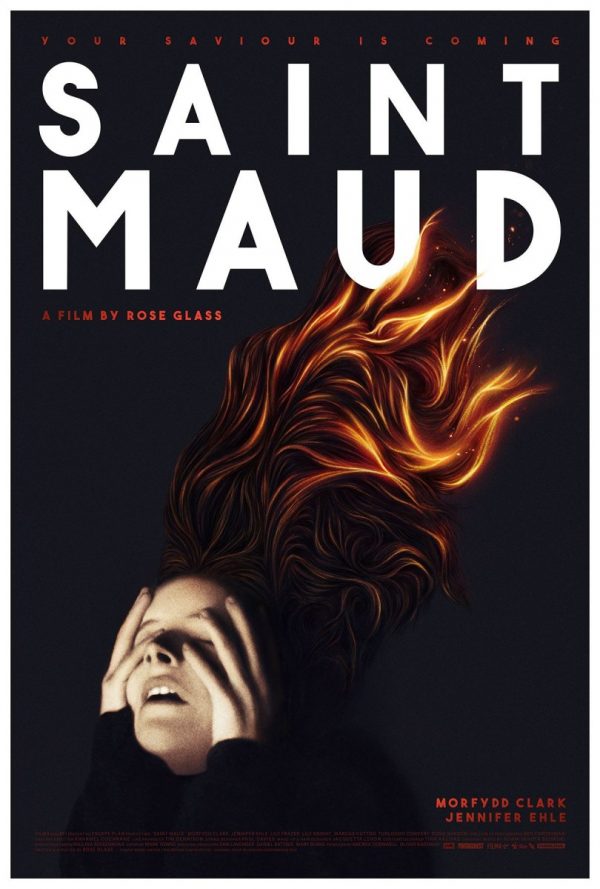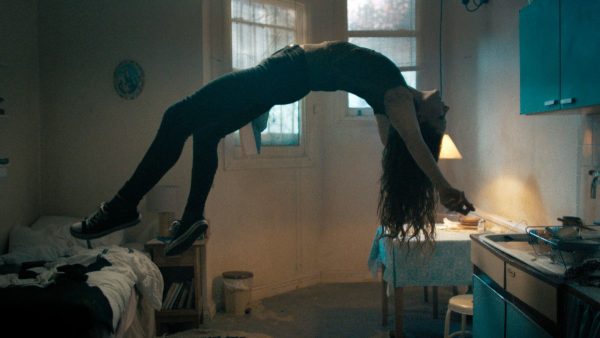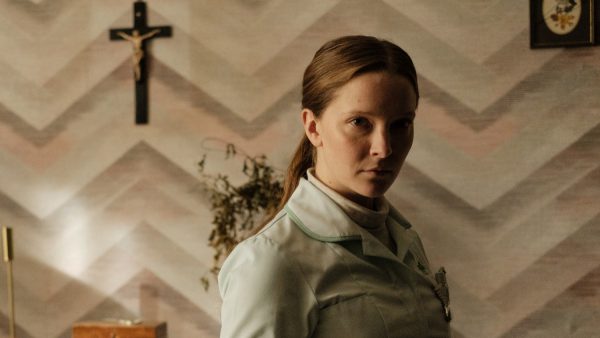Saint Maud, 2019.
Directed by Rose Glass.
Starring Morfydd Clark, Jennifer Ehle, Lily Frazer, Lily Knight, Rosie Sansom and Turlough Convery.
SYNOPSIS:
After recently finding religion, a nurse tries to put her past aside as she becomes the full-time carer of a terminally ill woman.
It has been a long old journey to the UK multiplex circuit for Saint Maud. Brit director Rose Glass’s simmering seaside shocker first premiered at the Toronto International Film Festival back in the halcyon, pre-pandemic days of September 2019. Rave reviews carried it through numerous other festivals too and a cinema release in its home country was planned for earlier in the year. Now, the movie has finally arrived, and it’s well worth taking a dive into its chilly, quietly terrifying world.
The Maud of the title (Morfydd Clark) is a nurse, who lost her job at a hospital in the wake of a tragic event and has since found God, becoming increasingly devout in her views. She has landed a role as the full-time carer for terminally ill former dancer Amanda (Jennifer Ehle) and soon forms a close connection with her client. In Maud’s eyes, she’s on a divine mission to act as a saviour for her new acquaintance before she meets her maker. What starts as caregiving quickly becomes friendship but, just as quickly, the seeds of a dark obsession begin to sprout.
Glass weaves this very internal story with a keen eye for how to find the depth and meat in storytelling that is, visually and narratively, rather sparse. The images she does use are scalpel-sharp in their precision. Ben Fordesman’s cinematography so perfectly captures the out-of-season weirdness of British coastal towns in winter that you can feel the icy chill of the sea breeze and the unflattering neon glow of amusement arcades. Adam Janota Bzowski’s score, meanwhile, is just as comfortable providing quiet accents as it is honking and squawking through the scariest moments.
Clark is wonderful in the lead role, navigating the charming exterior of Maud as well as she conveys the darkness bubbling within her. She’s a woman with a clear obsessive streak, which has transferred from her healthcare vocation to her adherence to the ways in which she interprets religion. “I should have expected resistance,” she says in prayer, “nothing worthwhile comes easily”. Her faith curdles into something dangerous, with Maud forcing the entire force of her personality into the box marked “for God”. Clark’s sweetness comes with real edge, and it makes Maud as terrifying as she is tragic.
Saint Maud also benefits from stellar work on the part of Jennifer Ehle, who has excelled recently in disarmingly normal evil roles, such as her horrifying conversion therapy advocate in The Miseducation of Cameron Post. She’s great in the ways she subtly undermines Maud, who fails to track her sarcasm and takes every minor slight personally. At one stage, a birthday party takes a grim turn after Maud is literally left in the dark while manning the lights as Amanda is given her cake.
Glass amps up the camera dynamism as Maud’s personality fractures, swapping quiet order for Dutch angles and chaos, with the score prioritising more distortion and disorientation. The unease builds beautifully to a concluding scene of powerful, dark creativity that culminates in what is almost certainly the most viciously indelible final shot of the year so far. The A24 label in the US and plenty of talk of “elevated horror” will try to force Saint Maud into a box, but Glass has crafted something far slipperier and more inventive than any genre label can convey.
Flickering Myth Rating – Film: ★ ★ ★ ★ / Movie: ★ ★ ★ ★
Tom Beasley is a freelance film journalist and wrestling fan. Follow him on Twitter via @TomJBeasley for movie opinions, wrestling stuff and puns.













